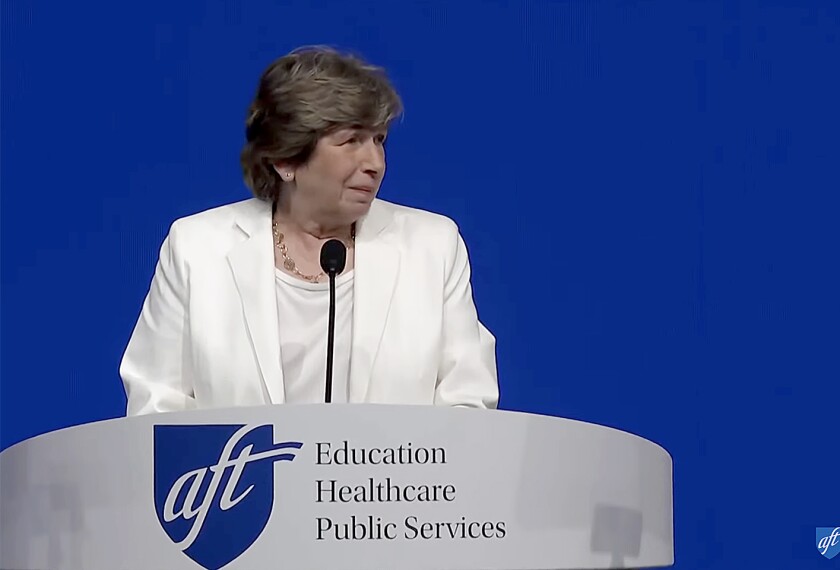U.S. Secretary of Education Arne Duncan continues to send strong signals that he may grant tailored, district-level waivers from the No Child Left Behind Act in states that have not already won such flexibility.
In a wide-ranging, hourlong interview with a small group of national reporters last week, Mr. Duncan said he met in Washington with some of the California superintendents leading the charge for district-level waivers—and will start examining this option in earnest after the Feb. 28 deadline for states to apply for the next round of waivers.
“Once we get past that deadline, if we have certain places not apply and not show interest, then I think it’s incumbent upon our team to think through what we do to take that next step,” he said.
During the Feb. 21 interview, the secretary continued to outline his priorities for the next four years, including his commitment to help pass gun-control legislation and start a national conversation on mental health as part of the Obama administration’s response to the December school shootings in Newtown, Conn.
Sequestration Looms
But for right now, the most immediate concern at the department is whether Congress will avert automatic trigger cuts set to go into effect March 1 under what’s known as sequestration. Congress put the threat of those cuts into place in 2011 as part of a broader deal to raise the debt ceiling. The intention was that the prospect of onerous, across-the-board cuts would prod lawmakers instead into coming up with a long-term, deficit-reduction plan—which so far remains elusive.
The sequestration cuts, which would affect most federal agencies, would translate into the loss of an estimated $725 million in Title I funds for disadvantaged students and $598 million in special education funds, Mr. Duncan’s staff said last week. The first to feel the pain, however, would likely be students who benefit from the Impact Aid program, which stands to lose about $60 million immediately. That money helps districts with a lot of federal land or facilities such as military bases make up for lost tax revenue.
“I’m increasingly concerned this is going to happen,” Mr. Duncan said of sequestration, adding that a few districts have already started to give teachers reduction-in-force notices that their jobs might not be there next year.
The National Education Association estimates that those pink slips will start flying in earnest as early as this week.
Obama Priorities
Although it’s been more than a month since President Barack Obama proposed to expand preschool to more low-income families and to create a high school redesign contest, Secretary Duncan said details would have to await release of the president’s fiscal 2014 budget proposal, expected in coming weeks.
The secretary said he will also spend the next couple of weeks in meetings on Capitol Hill to determine if Congress is serious about rewriting the Elementary and Secondary Education Act, of which the No Child Left Behind law is the current version.
Until then, his department’s waivers are ruling the federal accountability landscape.
The Obama administration is using waiver authority granted under the current NCLB Act to give states flexibility from what are considered some of the more burdensome parts of the law—including the requirement that 100 percent of students be proficient in math and reading by the end of the 2013-14 school year. In exchange for that flexibility, states had to design their own accountability systems, use student growth as part of teacher evaluations, and identify 15 percent of the lowest-performing schools for targeted interventions.
So far, the department has granted waivers to 34 states plus the District of Columbia. Eight more have applications pending.
Iowa and California had their requests rejected because they did not meet the federal department’s requirements.
During this fourth-round application window, a few more states are expected to ask for flexibility, department officials said. Holdouts Pennsylvania and Texas are among those likely to make requests.
Consortium to Apply
Also among the applications will be the 10 districts—including Los Angeles and San Francisco—that make up the California Office to Reform Education. Known as core, they are moving ahead with changes their state is slow to embrace (such as the Common Core State Standards and new teacher evaluations). They met with Secretary Duncan on Feb. 20.
CORE Executive Director Rick Miller said, “We did leave with high hopes. There were no guarantees, but the conversation was completely focused on how to make it work as opposed to the reasons it wouldn’t work.”
The consortium specifically wants flexibility in spending Title I funds, which are currently locked up in providing interventions such as tutoring and school choice in schools that do not meet annual academic targets. A waiver could free up $110 million in federal funds a year among the 10 districts, said Michael Hanson the superintendent of Fresno, which is a core member.
“This is not us seeking a waiver from NCLB … but seeking a waiver to something that’s more comprehensive,” said Mr. Hanson, who also attended the Feb. 20 meeting with Mr. Duncan.
Given that the department’s waiver process applies only to states, it is wholly unclear how a district-level waiver process would work. Carmel Martin, a top aide to Mr. Duncan, who attended the interview, said that there are “challenges” because under the part of the NCLB Act that gives the secretary waiver authority, Mr. Duncan would have to make the case that the district-level flexibility would improve student achievement or instruction in those districts.
In general, said Ms. Martin, the assistant secretary for planning, evaluation, and policy development, “we would want to, just as we did at the state level, have a very high bar.”




